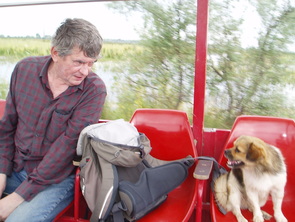 Yes, we communicate!
Yes, we communicate! Too many educated people believe that “communication” stands for giving speeches and writing communiqués “to pass the message”; or filling empty heads with nagging, brain-washing, “news”.
Other savants, abstract mechanic boxes and arrows to broadcast bits and pieces of “information” transmitted from A to B and injected through imaginary piping, funnels and needles of “media”. As if the receivers were blanc slates, not people who judge and who actively seek knowledge.
Add to this some arrogant ignoramuses at the top of faceless organisations, confusing communication between humans who take part in it with power-point diagrams and “timelined” wordy “plans” resulting in “correct messages” parroted downwards upon increasingly cynical “audiences” of “targets”. This is the fig-leaf of post-industrial tyranny.
On their side, the “simple people like you and me” figure communication as being a right to speak up, to express freely, to ask questions and have made public “those things they do not tell us”. Innocent indeed.
*
If you aspire instead to gain mastery of communication with people, go beyond all this nonsense. Such naive and mechanical beliefs put the communicating mind to sleep. They prevent communication - which is the communion-creating movement of meaning, to come alive, to create social reality and so, have the amazing impact of “doing things with words” [1].
*
To help people who care to go past dead communication “strategies” and “plans” and clumsily formulated “messages”, I would represent communication in a few incomplete, humble but essential, aphorisms:
Communication takes place when:
- you have something to make known and understood, an idea, some substance of interest to other people, or, when other people have something to witness, of interest to you
- you discern the radical difference between expressing what you long to get off your chest and conveying something with a purpose to make things happen, to affect peoples’ hearts and minds
- you understand that who you are and represent, your actions, that which can be seen and felt of you, speaks irresistibly, louder than any possible words
- you know - following the millennia-old recipe of the Philosopher - that you only make a difference when you are recognised as credible, competent and well intended, when you additionally look around and observe the occasion and “where people’s mind is” (to start from there) before you try to change their mind with limpid ideas leading to action
- when what you are about to say and do, makes sense to your public and the way you decide, your interests, your aims, appear transparent (or opaque, that is telling too)
- when you understand that, like tango, communication needs an available partner, ideally a dialogue; half of what you communicate comes from those receiving it, from their understanding
- when you use words, gesture, symbols and image crafted to fit the people here and now, with arguments acceptable locally, leading to mind-size conclusions which people can own, and feasible action they can start “next thing”
- when you are able to show, point, cause to be tasted and experienced, instead of just “speaking about”
- when, before you speak, write, report or debate, you do your homework: study, inform yourself and find out, in order to be knowledgeable – that is the less visible but core part of “communication”
- when you think - to decide each time before you address people - if and why you will talk, to whom, in what way, with what purpose
- if you look or don’t look into people’s eyes when you speak to them or when they speak to you (because you are aware of cultural differences)
- when you listen actively, mindful to find something out or to learn...or you don’t (both are powerful signals)
- you understand and practice the power and the skill of timing, keeping silent, saying nothing, for a moment or for good
- you leave space and invite occasion for other people to speak, do not censor them, aware that this is an important undertaking, a living process, worth to be given time
- you hear and understand what is said (without which communication is wasted, noise), or if you don't, ask for clarification
- you participate truly, walk the mile in the shoes of one who addresses you
- you observe that many things are “telling” – on purpose or unawares - more than with words uttered, you consider what is said, but also what is not said, loudly missing
- you build trust and grant trust and encourage people to open up and share what is on their mind and what they know – to create a climate of communication instead of hypocrisy and over-prudence
- you create environments, rituals of interaction and regular occasions for people to share experiences, agree on meanings, where people learn to talk to each other and reason in concert
- when your interactions result in situations where people go past words: when they feel, agree, believe, hope, belong and achieve
In sum: competent communication is when you knowingly create occasions and encounters and do meaningful things, to share and let share meaningful things, in ways that make people belong to communities of knowing, feeling and action. Communication is a state of relationship in movement.
------------------------------------------
[1] How to do Things with Words: The William James Lectures delivered at Harvard University in 1955, 1962 (eds. J. O. Urmson and Marina Sbisà), Oxford: Clarendon Press, 1962
 RSS Feed
RSS Feed